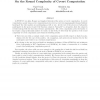Free Online Productivity Tools
i2Speak
i2Symbol
i2OCR
iTex2Img
iWeb2Print
iWeb2Shot
i2Type
iPdf2Split
iPdf2Merge
i2Bopomofo
i2Arabic
i2Style
i2Image
i2PDF
iLatex2Rtf
Sci2ools
113
click to vote
STOC
2010
ACM
2010
ACM
On the Round Complexity of Covert Computation
In STOC’05, von Ahn, Hopper and Langford introduced the notion of covert computation. In covert computation, a party runs a secure computation protocol over a covert (or steganographic) channel without knowing if the other parties are participating as well or not. At the end of the protocol, if all parties participated in the protocol and if the function output is “favorable” to all parties, then the output is revealed (along with the fact that everyone participated). All covert computation protocols known so far require a large polynomial number of rounds. In this work, we first study the question of the round complexity of covert computation and obtain the following results: • There does not exist a constant round covert computation protocol with respect to black box simulation even for the case of two parties. (In comparison, such protocols are known even for the multi-party case if there is no covertness requirement.) • By relying on the two slot non-black-box simulatio...
Related Content
| Added | 17 Jul 2010 |
| Updated | 17 Jul 2010 |
| Type | Conference |
| Year | 2010 |
| Where | STOC |
| Authors | Vipul Goyal and Abhishek Jain |
Comments (0)

